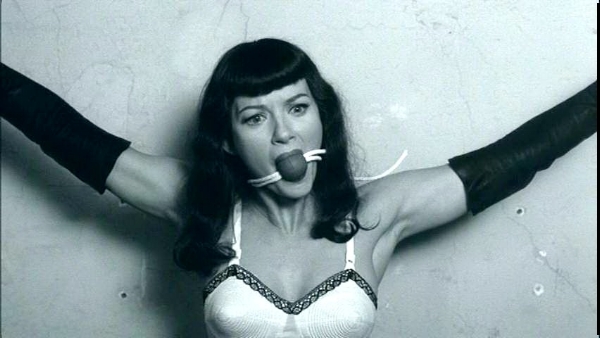The Myth But Not The Pathos
The Notorious Bettie Page
The New York Sun: April 14, 2006
Whoever said moral decadence, perversion, and cultural decline couldn't be fun? There was a time - a serious, earnest time - when the women of Hollywood's biopics were history's greats: They were queens, empresses, Marie Curie. And now? Well, let's just say England's Bess has been joined by Tennessee's Bettie. She's a queen, yes, but of the pinups, a bondage icon and retro cheesecake, and now she's the subject of Mary Harron's delightful, witty, and touching new movie, "The Notorious Bettie Page."
Bettie Page? Oh yes, you know her. You've seen her face, and maybe much more.
Half a century ago, you might have caught her picture in one of those mags that your dad used to hide from your mom. Blue eyes, black bangs, hokey scowl, sweet smile, succulent figure: She was the most photographed girl next door in the world, some said. You could gaze at her in Gaze and get an eyeful in Eyeful and many, many, other naughty places, even Playboy (January 1955, Santa's cap, nothing else).
There were movies too, three burlesque films, "Striporama," "Varietease," and "Teaserama": The dancing is bad, the comedy acts worse. And then, under the counter, plain brown envelope please, there were those specialty flicks, "Domineering Roz Strikes Again," "Captured Jungle Girl," "In Chains," "Hobbled in a Kid Leather Harness," you get the picture. If you don't, some of the most amusing, if slightly alarming, sequences in "The Notorious Bettie Page" will give you some guidance. Gently, of course. There's no need to be afraid. Trust me.
In the end, the ropes, harnesses, jungle girls, and ball gags were too much of a temptation for Estes Kefauver, an ambitious senator and fashion disaster (coonskin hats, I'm afraid) from Bettie's home state, who'd already trashed comic books in an earlier bout of national hysteria. Hearings were held in 1955. They were the usual grandstanding farce, but were enough to ensure that, not so long afterward, Bettie Page disappeared into obscurity. Her image lingered on without her, and decades later, burnished by nostalgia, and safely lodged at the intersection of camp and carnal, her whips, her smile, and her curves began to resurface. Her visage appeared in comic books (sorry, Senator), fashion shoots, archive collections, posters, T-shirts, photos, souvenirs, any number of tchotchkes (a "tigress" air freshener will cost you $2.95), and, of course, the Internet. As I said, you've seen her.
This film will only add fuel to the fire and sweat to the brow. Its director, Ms. Harron, was previously best known for the perceptive and clever "I Shot Andy Warhol" (1996), the story of Valerie Solanas, the lady who did just that. In "The Notorious Bettie Page," Ms. Harron takes on the story of another woman who was both of, and ahead of, her era. Her Bettie (beautifully played by Gretchen Mol) is a classic American heroine, intelligent, spunky, driven, and good-hearted. No virgin queen (sorry, Bess), she bares with a grin, and maintains her decency, and more remarkably, her dignity, even amid the manacles, catfights, and hog-tied poses ("just silliness," she says) of her more bizarre photographic adventures. "God gave me the talent to pose for pictures ... and it seems to make people happy." She doesn't drink, she doesn't smoke, she gives the casting couch a miss, and when she eventually returns to Jesus, she doesn't have far to go.
This is an America (shot mainly in evocative black-and-white, with bursts of lush, overripe color) that is, like Bettie, both innocent and not. The gawking shutterbugs for whom Bettie poses in session after session after session don't touch, but they do stare. How they stare. Irving and Paula Klaw (sinister name, nice people), the brother-and-sister team that produced many of her pinups and all her bondage work, are pictured as lovable entrepreneurs, hard-working, honest, and careful to avoid falling afoul of the law (no nudity, two sets of underwear in case anything, you know, shows).They are examples of good business practice at its disgraceful, amoral best. Irving (Chris Bauer) is a busy, endearing schlub in shirtsleeves, and Paula (a lovely performance by Lili Taylor, who also played Solanas for Ms. Harron) the shrewd den-of-vice mother that Bettie still remembers with affection: "She never tied any ropes too tight."
Ms. Harron shows this America to be, as indeed it was, a rough, tough place - its noir-and-neon sophistication no more than surface sheen, delusion, opportunity, and trap. Bettie was a survivor (her ordeals included abuse as a child and, later, an appalling sexual assault), but she remained a true child of the Great Depression, unable to escape the hardscrabble life, even when things were going well. Her brush with glamour was only at the edges of fame, her gimcrack stardom (if that's the word) cheap, tawdry, and ill-paid.
Ms. Harron is too smart to avoid the flaws in Bettie's 15 minutes, but her desire to package the Tennessee Tease as a prophet of tolerance and female empowerment glosses over Bettie's darker pages. In particular, we are never shown the miserable later years, the bleak truth of the legendary "disappearance" that in reality was a descent into schizophrenia and a decade in a California asylum, a fate that inevitably raises disturbing questions about her true state of mind throughout that lost pinup heyday.
The director's silence is probably just fine with Ms. Page, out and about now, an old woman so wrapped up in her myth that she almost never agrees to be photographed. "I want to be remembered," she has recently said, "as I was when I was young and in my golden times."
Golden? There wasn't even much glitter. But I'm not sure that Ms. Harron wants us to know that.
